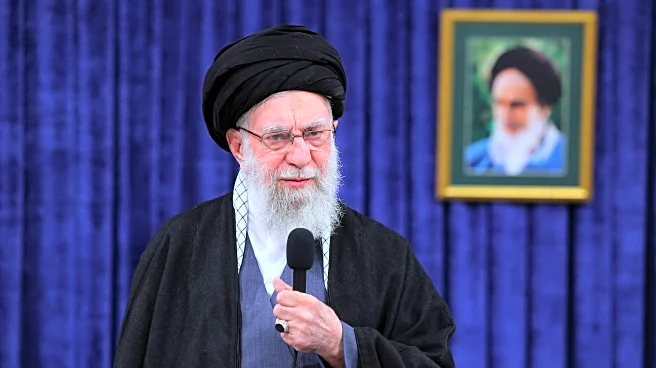What's Happening?
Recent Israeli military operations in Gaza have resulted in significant civilian casualties, with at least 17 Palestinians killed, including children and women. The strikes targeted residential areas in central and southern Gaza, leading to widespread destruction and loss of life. The humanitarian situation in Gaza is deteriorating, with famine conditions reported in Gaza City. The United Nations has highlighted the worsening food crisis, exacerbated by Israel's halt on aid deliveries since September 12. Over 300,000 people have fled the area, but many remain trapped due to financial constraints. International pressure for a ceasefire is mounting, with French President Emmanuel Macron advocating for peace talks and urging President Trump to intervene.
Why It's Important?
The escalation in Gaza has significant implications for regional stability and international relations. The humanitarian crisis poses a severe challenge to global aid organizations and could lead to increased international intervention. The ongoing conflict affects U.S. foreign policy, particularly in its relations with Israel and Palestine. The situation also impacts the broader Middle East peace process, with potential repercussions for U.S. diplomatic efforts in the region. The humanitarian toll and the geopolitical stakes underscore the urgent need for a resolution to prevent further loss of life and regional destabilization.
What's Next?
The international community is likely to increase diplomatic efforts to broker a ceasefire and address the humanitarian crisis. President Trump and other global leaders may face pressure to facilitate peace talks and provide humanitarian aid. The United Nations and other organizations may intensify their calls for access to deliver aid to affected areas. The situation could lead to further political negotiations, with potential shifts in U.S. and Israeli policies depending on the outcome of diplomatic engagements.
Beyond the Headlines
The conflict in Gaza raises ethical and legal questions regarding military operations in densely populated civilian areas. The humanitarian crisis highlights the need for international legal frameworks to protect civilians in conflict zones. Long-term implications include potential shifts in international law and policy regarding humanitarian aid and conflict resolution. The situation may also influence public opinion and advocacy efforts related to human rights and international peacekeeping.










